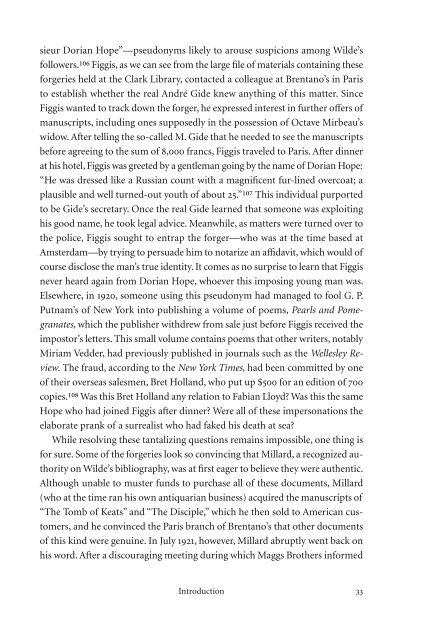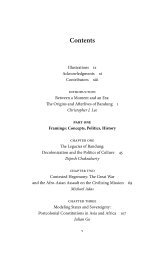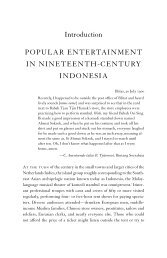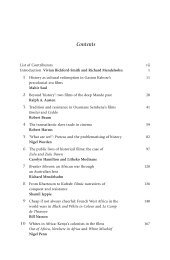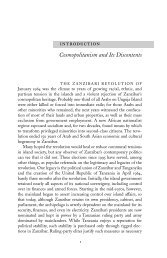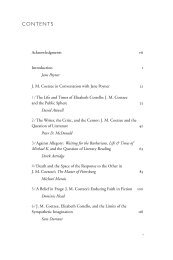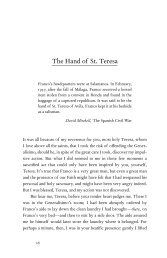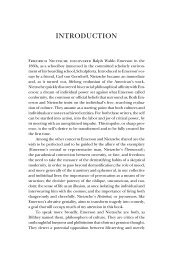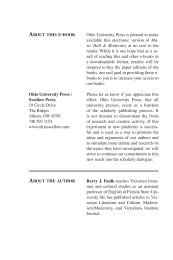Oscar Wilde and Modern Culture - Ohio University Press & Swallow ...
Oscar Wilde and Modern Culture - Ohio University Press & Swallow ...
Oscar Wilde and Modern Culture - Ohio University Press & Swallow ...
Create successful ePaper yourself
Turn your PDF publications into a flip-book with our unique Google optimized e-Paper software.
sieur Dorian Hope”—pseudonyms likely to arouse suspicions among <strong>Wilde</strong>’s<br />
followers.₁⁰₆ Figgis, as we can see from the large file of materials containing these<br />
forgeries held at the Clark Library, contacted a colleague at Brentano’s in Paris<br />
to establish whether the real André Gide knew anything of this matter. Since<br />
Figgis wanted to track down the forger, he expressed interest in further offers of<br />
manuscripts, including ones supposedly in the possession of Octave Mirbeau’s<br />
widow. After telling the so-called M. Gide that he needed to see the manuscripts<br />
before agreeing to the sum of 8,000 francs, Figgis traveled to Paris. After dinner<br />
at his hotel, Figgis was greeted by a gentleman going by the name of Dorian Hope:<br />
“He was dressed like a Russian count with a magnificent fur-lined overcoat; a<br />
plausible <strong>and</strong> well turned-out youth of about 25.”₁⁰⁷ This individual purported<br />
to be Gide’s secretary. Once the real Gide learned that someone was exploiting<br />
his good name, he took legal advice. Meanwhile, as matters were turned over to<br />
the police, Figgis sought to entrap the forger—who was at the time based at<br />
Amsterdam—by trying to persuade him to notarize an affidavit, which would of<br />
course disclose the man’s true identity. It comes as no surprise to learn that Figgis<br />
never heard again from Dorian Hope, whoever this imposing young man was.<br />
Elsewhere, in 1920, someone using this pseudonym had managed to fool G. P.<br />
Putnam’s of New York into publishing a volume of poems, Pearls <strong>and</strong> Pomegranates,<br />
which the publisher withdrew from sale just before Figgis received the<br />
impostor’s letters. This small volume contains poems that other writers, notably<br />
Miriam Vedder, had previously published in journals such as the Wellesley Review.<br />
The fraud, according to the New York Times, had been committed by one<br />
of their overseas salesmen, Bret Holl<strong>and</strong>, who put up $500 for an edition of 700<br />
copies.₁⁰⁸ Was this Bret Holl<strong>and</strong> any relation to Fabian Lloyd? Was this the same<br />
Hope who had joined Figgis after dinner? Were all of these impersonations the<br />
elaborate prank of a surrealist who had faked his death at sea?<br />
While resolving these tantalizing questions remains impossible, one thing is<br />
for sure. Some of the forgeries look so convincing that Millard, a recognized authority<br />
on <strong>Wilde</strong>’s bibliography, was at first eager to believe they were authentic.<br />
Although unable to muster funds to purchase all of these documents, Millard<br />
(who at the time ran his own antiquarian business) acquired the manuscripts of<br />
“The Tomb of Keats” <strong>and</strong> “The Disciple,” which he then sold to American customers,<br />
<strong>and</strong> he convinced the Paris branch of Brentano’s that other documents<br />
of this kind were genuine. In July 1921, however, Millard abruptly went back on<br />
his word. After a discouraging meeting during which Maggs Brothers informed<br />
Introduction 33


